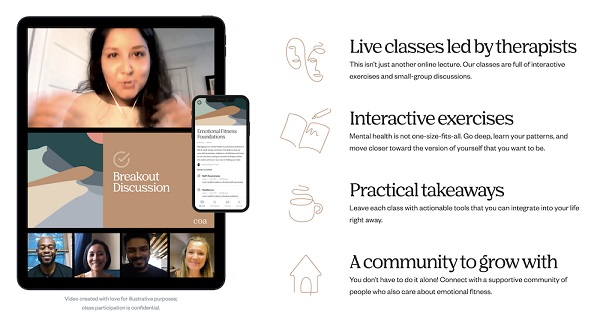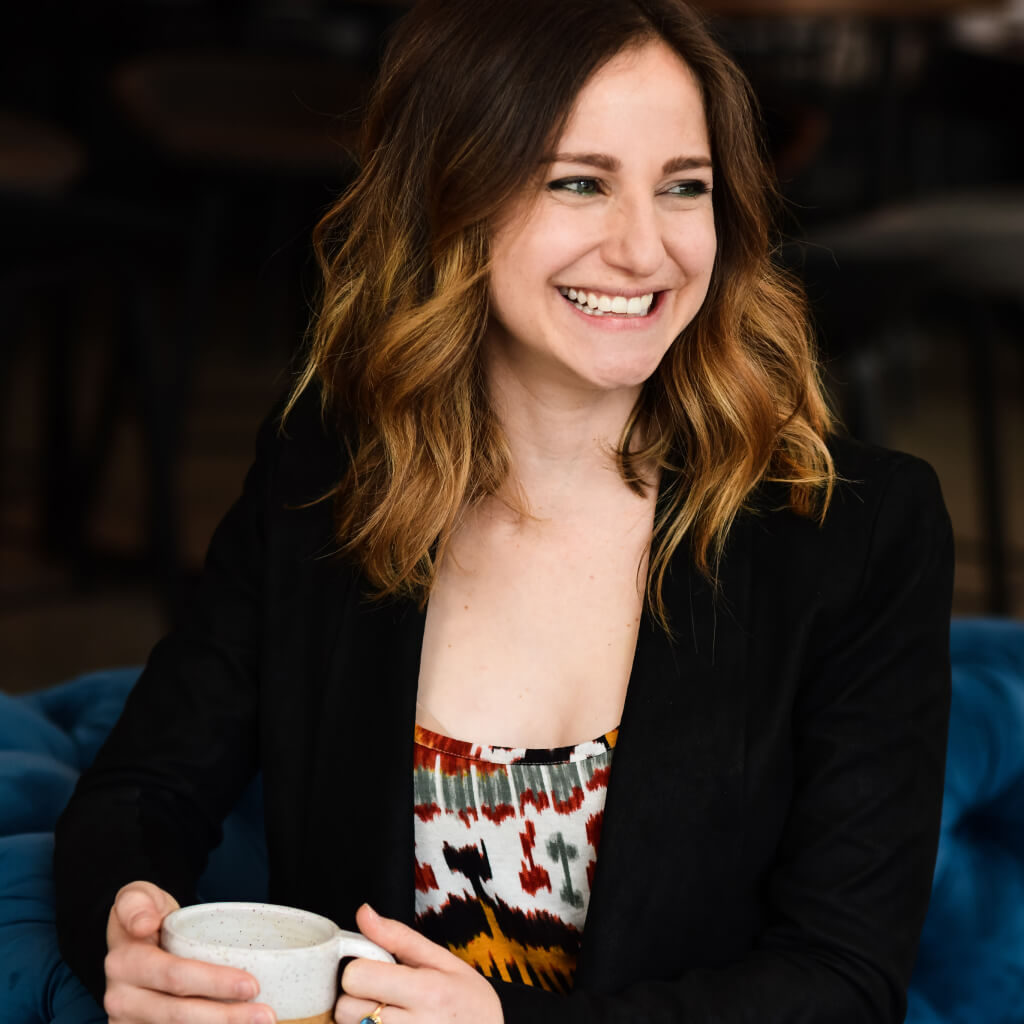Emotional Fitness Should Be Glossy, Thinks Coa

Coa thinks mental healthcare deserves the glossy surface of a fitness brand and claims it has an underlining approach to make you more psychologically resilient.
If the founders of the San Francisco-based emotional fitness startup Coa make it a success — and if the COVID-19 pandemic subsides with fitness studios intact — expect to see the logo of the company, which dubs itself as “the world’s first gym for mental health,” in posh city neighborhoods next to the local Equinox, SoulCycle or Orangetheory Fitness studio.
Co-founders Emily Anhalt, a psychologist, and Alexa Meyer, who has a background in digital marketing, think their concept belongs side by side with those gym brands whose ethos and the social acceptability they want to channel into “emotional fitness centers.”
“There is no equivalent in the mental health world,” Anhalt told Athletech News. “Therapy is always hidden in the back of a building somewhere, behind two locked doors. While we do take confidentiality seriously, it shouldn’t be treated as a dirty little secret.”

For clients, that means getting paired with a licensed therapist who works through the company as an independent contractor (in a model popularized by TalkSpace and BetterHealth) and also eight-week classes, led by employee therapists, with themes like Emotional Fitness for Leadership and Emotional Fitness for Anxiety. Think of it as like meeting with a personal trainer and also going to a group fitness class, said Anhalt, who tailored it for overstressed “high-achievers.” The Coa combo can be done online and, someday after COVID-19 crisis, at brick-and-mortar locations it hopes to establish, starting in New York and San Francisco.
Coa (short of coalesce) will formally launch its online service early next year. The company has beta-tested its approach online and has $3 million in investor money. The target demographic is tech sector workers, a group prone to seeking self-optimization and the next buzzed-about brand that promises it.
“With this population, there is a lot of pressure to wait until things are falling apart to get support,” said Anhalt, a psychoanalytic psychologist who built a specialty with the tech employees in her 11 years of practice. “[T]hat’s really problematic because just like with physical health if you do the work more proactively you can actually prevent a lot of things instead of trying to fix them and you can build your resiliency muscles.”
The gym analogy is woven throughout the company’s operations and marketing. Anhalt said she believes mental health deserves the same posh presentation as social status gyms like Equinox.
Behind the bright exterior, she said she developed a framework of ideas about the unique psychological issues of Silicon Valley denizens who aspire to build companies from the ground up.
She said she’s been around serial entrepreneurs and tech employees all her life. “Growing up in San Francisco, that’s just who my friends and community are.”
To develop the curriculum of Coa, she interviewed a hundred psychologists and a hundred tech entrepreneurs. This lead to seven “traits of emotional fitness” that underpin its programs (self-awareness, empathy, willingness to play, curiosity, mindfulness, resilience and effective communication) and also an understanding of the drive behind tech founders.
“A person who starts a company often has something to prove and whether they are trying to prove it to themselves or their family or to the world,” she said. “There is this real internal motivation pushing them on.”
She added that they have a contradictory-seeming combination of self-importance and self-doubt that actually work hand in hand.
“You have to have some narcissistic characteristics to start this company because you are seeing something no one else sees because you are seeing something that does not exist yet,” she stated. “People are telling you not to do it; it will never work. And you decide to believe in yourself so much that you do it anyway and at the same time I’ve noticed that most founders are secretly worried that they have no idea what they are doing, that they are making up everything as they go along and they are giant frauds.”
This drive can take a toll on their emotional fitness, one they don’t notice because of the tunnel vision of getting their projects off the ground.
“Your time is being taken up, your relationships are taking a hit,” she said. “You are dealing with setbacks and failure all of the time and you push forward because you see this visions ahead.”
At the same time, tech founders and CEOs can be strict about their workout routines and diets, trying to get the most out of themselves. Anhalt hopes to coax them into emotional fitness routines by giving them the same presentation.
In most instances, prices for sessions with a therapist will be “market rate for San Francisco,” she said. A session will cost $190 and a session with a therapist with ten or more years of experience will be $250. Some sessions will be available at a sliding-scale rate of $70, and some costs by be covered by a health insurer’s out-of-network reimbursement. Classes range from free to $30.
To keep people coming back, Anhalt is full of workout analogies. She said Coa’s regiment is “similar to a gym in that you can’t do one hard week at the gym and then expect to be healthy and no one can lift your weight for you.”
Nick Keppler is a freelance journalist, writer and editor. He enjoys writing the difficult stories, the ones that make him pore over studies, talk about subjects that make people uncomfortable, and explain concepts that have taken years to develop. Nick has written extensively about psychology, healthcare, and public policy for national publications and for those locally- based in Pittsburgh. In addition to Athletech News, Nick has written for The Washington Post, The Daily Beast, Vice, Slate, Reuters, CityLab, Men’s Health, The Gizmodo Media Group, The Financial Times, Mental Floss, The Village Voice and AlterNet. His journalistic heroes include Jon Ronson, Jon Krakauer and Norah Vincent.



